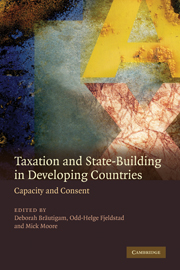Book contents
- Frontmatter
- Contents
- List of figures and tables
- List of contributors
- Acknowledgements
- 1 Introduction: taxation and state-building in developing countries
- 2 Between coercion and contract: competing narratives on taxation and governance
- 3 Capacity, consent and tax collection in post-communist states
- 4 Taxation and coercion in rural China
- 5 Mass taxation and state–society relations in East Africa
- 6 Contingent capacity: export taxation and state-building in Mauritius
- 7 Tax bargaining and nitrate exports: Chile 1880–1930
- 8 Associational taxation: a pathway into the informal sector?
- 9 Rethinking institutional capacity and tax regimes: the case of the Sino-Foreign Salt Inspectorate in Republican China
- 10 Tax reform and state-building in a globalised world
- References
- Index
2 - Between coercion and contract: competing narratives on taxation and governance
Published online by Cambridge University Press: 22 September 2009
- Frontmatter
- Contents
- List of figures and tables
- List of contributors
- Acknowledgements
- 1 Introduction: taxation and state-building in developing countries
- 2 Between coercion and contract: competing narratives on taxation and governance
- 3 Capacity, consent and tax collection in post-communist states
- 4 Taxation and coercion in rural China
- 5 Mass taxation and state–society relations in East Africa
- 6 Contingent capacity: export taxation and state-building in Mauritius
- 7 Tax bargaining and nitrate exports: Chile 1880–1930
- 8 Associational taxation: a pathway into the informal sector?
- 9 Rethinking institutional capacity and tax regimes: the case of the Sino-Foreign Salt Inspectorate in Republican China
- 10 Tax reform and state-building in a globalised world
- References
- Index
Summary
Introduction
This chapter is motivated by some important facts, some stimulating theory and an urgent policy concern. The facts are that, relative to the historical experience of the Organisation for Economic Cooperation and Development (OECD) countries, the governments of many contemporary developing countries are more independent of their domestic taxpayers for revenue. On average – and with wide variations – they depend a great deal on alternative sources of income that were not available to governments when the OECD countries were comparably poor: rents from natural resource wealth and strategic rents (in practice, mainly foreign aid). The theory suggests that there is a causal connection from (a) this dependence on rents, rather than taxes, to (b) the fact that public authority in much of the South is often relatively illegitimate, ineffective and unaccountable (‘bad government’). More simply, the proposition is that the dependence of governments on broad taxation for revenue is good for the quality of governance. If the theory were right, then we should like to change the ways in which many Southern governments are financed. The volumes of development aid, the modalities of the aid relationship and the control of rents from natural resource wealth all become important concerns from a ‘good government’ perspective.
- Type
- Chapter
- Information
- Taxation and State-Building in Developing CountriesCapacity and Consent, pp. 34 - 63Publisher: Cambridge University PressPrint publication year: 2008
- 87
- Cited by

